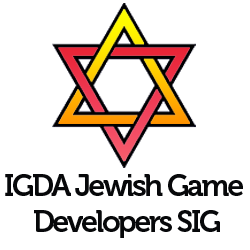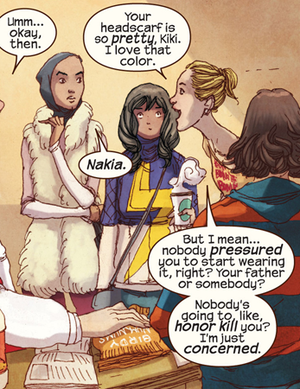Trending
Opinion: How will Project 2025 impact game developers?
The Heritage Foundation's manifesto for the possible next administration could do great harm to many, including large portions of the game development community.
How do you make games while coping with possible threats to your livelihood? We talked to Jewish game developers at GDC and beyond about how they're coping with recent anti-Semitic threats.

This story starts in the Jewish Contemporary Museum a few blocks away the Moscone Center in San Francisco. It's the day before GDC, and I'm in the museum's exhibit showcasing the work of artists whose families have survived events like the Holocaust, Native American genocide, and the Vietnam war.
I round the corner and bump into a game developer I've interviewed a few times for Gamasutra. We exchange surprised greetings, some trite comments about the work around us, and sensing something familiar in the way she looks at the exhibit, I ask “what brings you here?”
“Recent events,” she replies. We both chuckle a bit, but those ‘recent' events became all too real at GDC as the nearby Anti-Defamation League headquarters was targeted with bomb threats, part of a wave of harassing phone calls that hit other Jewish Community Centers throughout the country during the week.
As I wandered the GDC floor going from talk to talk, I wondered how other game developers felt, showcasing all this technology and game design as the world rumbled around us. I wondered how my fellow Jewish attendees felt, since the headlines for the last few weeks had been about tombstones being knocked down in our graveyards, Neo-Nazis converging on Washington D.C, and of course the aforementioned bomb threats.
So I asked. Like me, some of them were nervous, frustrated, a bit angry, especially at how anti-Semitism has lingered in the game development community, but also hopeful and open to embracing new roles as advocates and artists. Here's what they had to say.
Many of the recent incidents of anti-Semitism and White Nationalism have been chalked up to Donald J. Trump's Presidential victory in November. While they certainly spiked in November and December, a few developers couldn't help noticing this trend didn't begin overnight.
Take Stephen Jacobs, a professor at the Rochester Instititue of Technology who's also a veteran game developer and game historian. For the last few years, he's been working on the Jewish Play Project, which is one of many historical projects hosted on the RIT website.. As he's tried to document the history of Jewish creators and entrepreneurs in the toy and game business, he tells me that since 2014, he's been met with some odd encounters with online Anti-Semitism.
“A lot of colleagues at the university tell me tell me that if they're hosting a website with the word Jewish in it, it gets 5 times the attacks of other websites the university hosts,” Jacobs explains. When Jacobs himself made a public Gmail address to gather information for the project, Google shut down the account because so much anti-Semitic e-mail was flowing into it.
Jacobs is joined by Melanie Erlich, a voice actor and producer who previously helped organize the IGDA Jewish Game Developers' Special Interest Group. Last year, after a successful meeting with several Jewish game developers at GDC, she tried to recruit for a Jewish Game Developer group on Facebook to help organize events, game jams, GDC Seder dinners, etc.
 “I posted [about the group] in one developer group with 60,000 members. I figured some of them had to be Jewish. I said ‘hey, we started this group, if you're a member of the tribe, feel free to join and connect with other Jews.' I thought that sounded pretty innocuous!”
“I posted [about the group] in one developer group with 60,000 members. I figured some of them had to be Jewish. I said ‘hey, we started this group, if you're a member of the tribe, feel free to join and connect with other Jews.' I thought that sounded pretty innocuous!”
But the commentators, again, who were in a group for game developers, thought otherwise. The first commentators got defensive, asking why another group for Jewish developers was needed. “Just talk about whatever you need to in this group,” some wrote. “Why do you need to separate yourselves? What makes you so special?”
Erlich says even after clarifying that non-Jews could join (if they…really wanted to learn about Seder dinners and where to go for Sabbath), she was forced to deny a lot of group requests because scanning the profiles of the applicants, it became clear they weren't joining "for the right reasons."
Several of the developers interviewed for this piece shared similar sentiments about a long, slow-growing trend. Some made brief allusions to Gamergate, which displayed its fair share of anti-Semitism in 2014, others tied it in with rising anti-immigrant sentiment across Europe and the United States.
"I believe that you should recognize how people started a hate campaign against Jewish people, and you should recognize when people are trying to start a hate campaign against Muslim people. And you should stand up for them."
It's Alon Kaplan, a composer and sound designer from Israel, who first makes a link to attacks against immigrants from primarily Muslim and Latinx countries. “People see what's going on in the world in general, and racists have more courage to show themselves out, so it's affecting everyone. People that hate Jews feel they're more allowed maybe, to do stuff,” he speculates.
Kaplan's fairly upbeat about his experiences—we spoke just after he presented a session at GDC, and he was happy that none of the threats or attacks had affected him directly yet. But since his personal indie development team spans multiple nations including Israel and Germany, he is partly worried about how this rising tide of hatred could affect his team's ability to publish their game in the future.
Matthue Roth, a writer and programmer currently working at Google, tries to help his kids understand what's going on by reading comics with them. “They know there's scary stuff going on, but in a more abstract sense -- and we've all been reading Ms. Marvel a lot, the little episodes of prejudice we see there, and I think they identify with it" (see image below from Ms. Marvel #1, by G. Willow Wilson and Adrian Alphona).
 “It scares me that they understand what's going on, but at the same time I'm glad they're reading it. It lets them empathize with others, and it lets them know that they're not alone, that we're by no means the only ones getting targeted.”
“It scares me that they understand what's going on, but at the same time I'm glad they're reading it. It lets them empathize with others, and it lets them know that they're not alone, that we're by no means the only ones getting targeted.”
UX designer Nicole Stein can't help but relate what's happening to her community to the hate targeted toward Muslims. In late 2016, after the election, she tells me she was visiting her daughter's school when she learned that they'd been training them to hide in the bathrooms if an armed stranger appeared in the building. The training was in direct response to threats against JCCs and Jewish private schools that had already begun to swarm across the country.
And despite her own family's history fleeing the Middle East after political turmoil, she refuses buy into any animosity toward Syrian refugees or other Muslims who want to come to America. “I went to GDC…and I was talking to someone from Brazil living in San Francisco, and he asked me ‘well when you see a Muslim person, don't you kinda get nervous?'”
“I was like, 'No! I want to help them!' I believe that you should recognize how people started a hate campaign against Jewish people, and you should recognize when people are trying to start a hate campaign against Muslim people. And you should stand up for them.”
Stein and I had this conversation sometime after midnight at a GDC party midway through the week, and the divide between the celebratory mood and the weight of our discussion was palpable. She barreled onward with how she felt, not letting that divide stand in her way. "I feel no fear against Muslim people. I said that to that person earlier. I fear someone who is a nationalist who's telling me that it has to be one way. I fear against globalization. I fear people who want to close borders.”
“Games don't have borders. Anyone can download a game, and you should try to be inclusive, and don't buy into it. Don't make games that feed into that.”
Stein, among other developers, tries to find a solid link between these terrifying headlines and her work in the industry. The primary concern she has is the way game developers still demonize Muslims and make them the villains of so many action games. As a UX expert, she's worried about how it'll affect players' views about people from the Middle East.
"When you hear stuff like that, that people in the industry are willing to hear out something hateful…I hate that that's a dialogue we have to have. But you can't convince someone to change their mind if you don't have a dialogue with them."
But a few other developers are somewhat wary about what views their colleagues have and how they'll choose to express them. Aviva Schecterson, a game editor at Lone Shark Games and chair of the IGDA Jewish Developer's SIG, has mostly been happy with the way her coworkers have responded to threats in Bellevue, but she remembers a moment from her years at Digipen, a game development school, that leave her unsettled.
“I was super active on the Digipen campus in social justice and promoting diversity, and while it wasn't to my face, it was on 8Chan. [A fellow student] was saying some anti-Semitic stuff about me at Digipen. Just to know that I'd gone to school with someone who was like that was sort of scary for a while. ‘Who is this person? I don't know who they are…are they gonna come get me?”
Aubrey Isaacman, a UC Santa Cruz student and vice-chair on the SIG that Schecterson runs, shares similar stories from her campus that actually come from the opposite end of the political spectrum. She says students at UC Santa Cruz have used anti-Semitic imagery like Swastikas when arguing about social justice issues on campus, especially when the Israeli-Palestinian conflict is brought up.
(To be clear, Isaacman says this is not to say all the people she's met who sympathize with Palestinian people have been anti-Semitic to her, but that anti-Semitism has been a tool of some student activists to express anger at supporters of Israel and Zionists.)
Because as Isaacman points out, it's not just neo-Nazis who can wield anti-Semitism like a cudgel. We talked about some of the games she saw during the GDC design workshop, two of which were games deliberately skinned to show even basic mechanics can be twisted to glorify Nazism. “I wish there was a dialogue about why those examples are so important. You can't take the Judaism out of those examples, but no one talks about that.”
“They say ‘look, this is awful, [but they] don't go into why as much.”
To her relief, Isaacman says everyone who saw these games expressed horror at the thought of accidentally making a Genocidal game, but she says with so much anti-Semitism in the air, she's worried someone will make a game meant to instruct on the horrors of the Holocaust, but it will seem normal to some people who play.
And to those who see those game mechanics as "normal," what happens when they work alongside you in the game industry? While talking with Isaacman and Schecterson about college campuses, our conversation wandered over to the way alt-right and white supremacist speakers like Milo Yiannopoulos and Richard Spencer keep being invited to speak on campuses, despite both of them professing racist and sometimes Anti-Semitic views.
"Theoretically I just want to be out there, being a weird creative dude who makes stuff that you enjoy and just happens to be Jewish, and hope people see me and play my games and read my stories and think, okay, this Jew is pretty interesting and harmless, maybe other Jews can be cool too."
After some groans, Schecterson and Isaacman tried to grapple with the notion of having to be in communities with people who don't necessarily agree with those two men, but are willing to give them platforms “so they can be speak their point of view."
“It's difficult to express, but it comes down to ‘does this person care about me, and are they still my friend?' Schecterson says. “I don't want to work for them. I don't want to work WITH them until they get their shit together.”
Isaacman takes a different approach. “I'm a student, so it makes it intimidating. When you hear stuff like that, that people in the industry are willing to hear out something hateful…I hate that that's a dialogue we have to have. But you can't convince someone to change their mind if you don't have a dialogue with them.”
“With the games industry it's a bit scary to see seeds of it right now. I'm hoping there are enough people who want to hear us out to make that change.”
“There is this low ambient baseline, this little hum in the background, that's annoying.” That's how Stephen Jacobs characterizes this growth of anti-Semitism. “I'm not dealing with direct harassment or anything, but there's a subtext there. I'm still interviewing people for the Jewish Play Project, and some people are uncomfortable [to talk.]”
This is largely how the developers interviewed for this piece view current events, but Matthue Roth has been nearer to some of the bomb threats than others. “The actual attacks are definitely interruptions. But the emergence of popular white supremacy is also a step back,” he says. “It's putting a barrier between people who are trying to understand our way of life, or in my stories, trying to explain a Hasidic way of life.”
 It's important to remember most of the developers interviewed for this story aren't primarily activists. Some are historians, organizers, etc, but to be Jewish and to be a game developer isn't entwined with this need to change how the world views Jewish people. Sometimes it just means you're looking for a community to inhabit.
It's important to remember most of the developers interviewed for this story aren't primarily activists. Some are historians, organizers, etc, but to be Jewish and to be a game developer isn't entwined with this need to change how the world views Jewish people. Sometimes it just means you're looking for a community to inhabit.
“Theoretically I just want to be out there, being a weird creative dude who makes stuff that you enjoy and just happens to be Jewish, and hope people see me and play my games and read my stories and think, okay, this Jew is pretty interesting and harmless, maybe other Jews can be cool too,” Roth says. “But that doesn't really help when you're watching kids being shuttled into the streets because people are threatening to blow them up.”
(Right: a sculpture of The Bottled City of Kandor from Superman, which was on display at the Jewish Contemporary Museum---a reminder about how pop culture and generational trauma overlap.)
One of the most striking moments while I was chasing down these interviews was when I sat in on the IGDA Jewish Developers roundtable on the Thursday of GDC. I was tired—partly because of that late-night interview with Stein the night before, so I just sat in a corner and listened to the discussion, mostly aiming to take the temperature of the room.
At this roundtable, there wasn't a word about ongoing anti-Semitism. Plans were made for Purim next year, which will overlap with GDC. There were discussions about whether it was better to meet up afterward in Discord or Slack. Jews from Orthodox communities, Secular communities, and Israeli communities, swapped stories about what it was like getting into game development from where they were in the world.
After the roundtable, a student named Josh Gutenberg came up to me, and we briefly talked about his relationship with his Jewish grandparents and how the graveyard attacks were getting closer and closer to where his Grandfather was buried. He wishes he could do more, but knows he has to focus on job hunting and keeping himself afloat before he can direct his energy elsewhere.
Still, for someone who, like me, didn't grow up entrenched in a Jewish community, he thinks he did the right thing coming to this roundtable just to participate.
He said, “I feel like that connection's important to have. And that it would make [my Grandparents] happy to know I'm here.”
You May Also Like